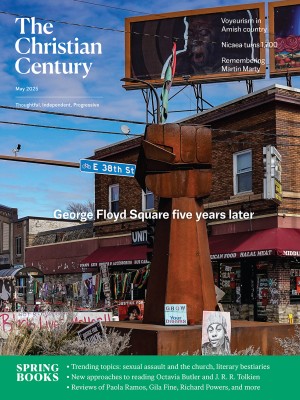We are not living in a postcolonial world
Many church folk use the word decolonization while ignoring its only goal: returning Indigenous lands to Indigenous hands.

Century illustration (Source images: Getty)
A few years ago I wrote a piece for the century on land acknowledgments (“On Native land,” November 2022). It focused on their uses and frequent abuses in Christian faith communities. That piece now reads like it comes from a more innocent time, a time when people believed that colonialism was essentially over and that, in its wake, the right thing to do was to follow a call to reflection and repentance—not necessarily activism, advocacy, or further engagement. But colonialism is not over now, and it was not over then.
Lately, the persistence of colonialism—and its ideological and practical resurgence in the United States—has startled and confused people in mainline Christian circles. In the early days of this presidential administration, the reaction to two of its executive orders was to render them farcical, a distraction from the administration’s real aims rather than illustrations of them. First was the attempt to rename the Gulf of Mexico, an international body of water. Although the Associated Press resisted calling it the “Gulf of America,” several news outlets and mapping companies quickly fell in line with the executive order. Second was the insistence on the use of the colonial name Mount McKinley for Mount Denali, a name from the Koyukon Athabaskan or Dena’ina people that means “the high one.”
Read our latest issue or browse back issues.
The nervous snickers and replicated memes in my circles seemed to assume that these were incendiary but ultimately empty gestures. But my ears are always attuned to renaming as a colonial move. Colonialism dominates the landscape by erasing Indigenous names along with Indigenous presence; it enacts erasure in part through language.
What went less noticed in the first weeks of the administration was a rash of executive orders which illustrate that colonialism is not only a word game plotted on maps. This administration has serious interest in oil and mineral extraction to feed its various patrons and their industries. Thus the repeated assertions that the United States will buy Greenland, or make Canada the 51st state, or acquire Ukraine’s rare earth minerals in a forced peace settlement. In its birthright citizenship order the administration cites historical documents that call into question Native citizenship in the United States. Its declared energy emergency opens the possibility of encroachment on Native land for drilling and extraction. Early ICE activity resulted in the detention of Native citizens and the refusal to recognize federally issued tribal citizenship documents as appropriate forms of identification. When executive orders cut off congressionally appropriated funding, tribes had to lobby the Department of the Interior to remind the White House that treaty-promised obligations are not discretionary spending. As a former vice president of the Congress of American Indians noted, “We prepaid for every penny we get with nearly two billion acres of land.”
When treaties, tribal sovereignty, and tribal citizenship stand in the way of this or any administration’s aims, these things tend to be challenged. Many Native people watch all of this with wary familiarity. We anticipated this flurry of activity in the first days of this administration. We saw it coming when dark money funded a case about tribal sovereignty that reached the Supreme Court last year. While tribal sovereignty prevailed in that instance (Haaland v. Brackeen), and while Justice Neil Gorsuch is a knowledgeable champion of tribal law, there are no guarantees when there is still a thirst for what remains of Indian land. We know that we are not living in a postcolonial world.
But in recent decades, some churches have acted as if a postcolonial world was dawning or had arrived. Maori scholar Linda Tuhiwai Smith notes that some Indigenous people have resisted the language of postcolonialism for just this reason. A decade ago, educational researchers Eve Tuck and K. Wayne Yang pointed out that the term decolonization is not a metaphor for bringing about social change or the reform of curricula or public policy. “Decolonization brings about the repatriation of Indigenous land and life,” they write—that is the sum of its meaning. Yet the language of decolonization is used repeatedly in the academy, according to Tuck and Yang, in ways that evade and avoid its actual meaning.
I would argue that the same is true of the church. In an ostensibly well-meaning sleight of hand, church bodies use the jargon of decolonizing while rarely working toward actual decolonization. The reforms sought under the guise of decolonizing our theology, liturgy, or institutional practices are not the same as decolonization’s one and only goal: returning Indigenous lands to Indigenous hands. Churches dwell in this evasion by equating official statements of repentance for collusion with colonialism—in the form of renouncing the doctrine of discovery or apologizing for church-sponsored tribal boarding schools—with colonialism’s actual end. So they ask: What do we do now to repent, investigate, and repair? These things need to be ongoing. But so does the work of recognizing that the harms of colonialism are ongoing, too.
Using the language of postcolonialism and decolonization can obscure the fact that we are not living in a postcolonial world. And so when the colonial world rears its head more assertively again, it takes some church folk by surprise. The work some churches have done on land acknowledgments or denouncing the doctrine of discovery, while important, has not necessarily prepared them to engage more deeply in defending tribal sovereignty, protecting tribal congregations, or engaging in meaningful public advocacy.
In the coming days there will be plenty of opportunities for churches to live out their professed commitments to the work of decolonizing. As I noted about land acknowledgments in that piece a few years ago, I note now in this context: We’ll have the opportunity to see if our allies are those who confess with their lips but not their hearts or those who show their commitment with their actions.







